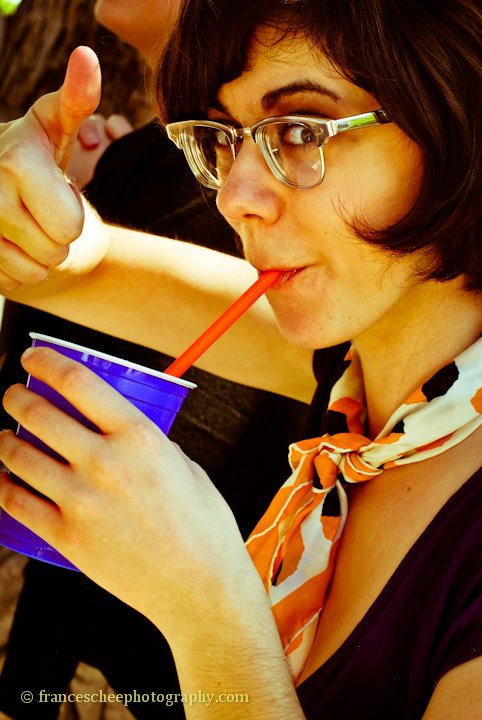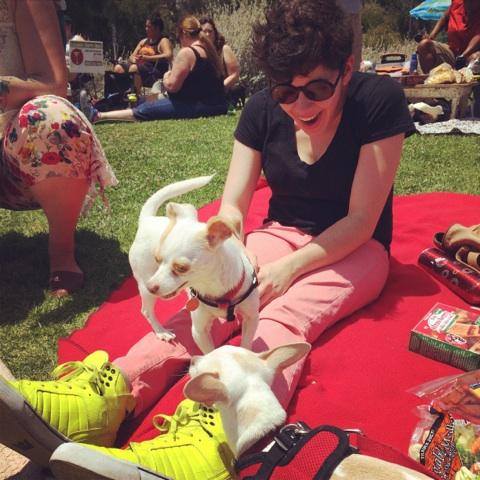feature image via shutterstock
In seventh grade, my choir teacher sent home instructions for our concert attire: black jumper, black tights, white button down, black dress shoes. She had outfitted generations of twelve-year-olds this way, and it seemed simple enough; half of the outfit even came school-issued. But her good intentions couldn’t save me from the nightmare of shoe shopping.
My shoes work hard. They have to be durable enough to withstand my heavy gait, sturdy enough to stay on without much help, and roomy enough to contain the ankle-high braces that straighten out my feet. Those are non-negotiable—when I went rogue and stopped wearing them for a few weeks in elementary school, my physical therapist said “do you want to walk when you’re 30? Put them back on.” They also double my shoe size. So the polite, precious Mary Janes my classmates bought for choir didn’t stand a chance. Instead, my mom and I compromised our way to a pair of clunky lace-ups straight out of the “orthopedic fashions” catalog at my surgeon’s office. I despised them so much that I refused to wear them for our first concert, opting last-minute to put black socks over the outside of my braces and wobble through.

Let’s play Spot the Gay Cousin
What I really hated — the part that filled me with a warm, visceral embarrassment I couldn’t quite articulate — was that they were men’s shoes.
If you look at photos of me as a child, it’s clear The Gay was strong with me from the beginning. I shopped almost exclusively in the boys’ sections of Target and Gap Kids, not because I felt like a boy, but because girls’ clothes seemed flimsy and impractical by comparison. I couldn’t play basketball or sneak around my neighbors’ backyards (a questionable pastime, I realize now) as easily in them. I didn’t care about gender; I just wanted to feel comfortable enough to do the things I liked to do.
That comfort started to erode as I became aware of my body. Specifically, I faced the delightful one-two punch of standard-issue puberty confusion and reckoning with cerebral palsy. It wasn’t just the fancy term for why I walked differently than my friends; it was now a defect that decreased my body’s value. That understanding made it more shameful, dangerous, and real. I was never bullied in the traditional sense, but one thing I did grasp fairly quickly was that disability meant I was Being a Girl wrong.
Being a disabled woman often feels like choosing between these life paths:
- Object of Pity/Perpetual Child,
- Inspirational Overachiever,
- Fetish Toy, or
- Good Disabled Girl Who Makes Sure Everyone Likes Her.
You’re supposed to shoot for number four. One tried and true way to do that is to “still” be pretty. If you can show that you understand how a woman is supposed to look and embody that, you’ve got a much better shot at being taken seriously as a “real” person. You know you’ve succeeded when able-bodied people start patting you on the back: “I never would have guessed!” “Of course people still want to date you!” “You don’t look disabled!” (Able-bodied folks: for the love of God, please stop assuming these are the “compliments” we want to hear.) You’re rewarded for knowing your place, for keeping disability from looking too scary, for being “normal in every way except.”
As I entered my twenties with a growing sense of alienation from my body (and mild panic over whether I would ever have sex), I looked to femininity to prove that cerebral palsy wasn’t me. The men’s shoes necessarily remained and I still wasn’t going anywhere near a dress, but I knew how to put on makeup and coordinate my scarf with my purse, thanks. I grew out my hair, didn’t wear shorts for ten years to keep my weird legs covered, and you know what, I actually got pretty good at it. I loved being the kind of disabled woman who wasn’t going to let cerebral palsy make her ugly. Looking pretty made my disability feel small, something I could beat back or outsmart. It let me replace my disgust with control. It became my solution.

Thumbs up for scarves! (Photo by Frances Chee Photography)
The story would end there if I felt like myself in those clothes. Plenty of disabled people (of every gender) do. There is nothing inherently weak or lesser about femininity, no matter what anyone tries to tell you. Despite my best efforts, though, it didn’t empower me; it made me feel like I was getting away with something. I knew that “myself” looked a lot closer to the eleven-year-old tomboy in those photos than the type of woman that, however successfully, I’d turned myself into. But I didn’t want to think about what that meant.
Disabled and masculine-of-center women deal with many of the same stereotypes: that we only look this way because we’re lazy, that we’ll never be “real” women, that we’re disgusting and unclean, that we know no one will ever want us. I worried that if gave up the femininity I’d worked so hard for, I’d just be giving in. As someone who has a lot of privilege, I thought it was my job to be the right kind of woman, even if I didn’t enjoy it.
I think I’d gotten it into my head that disability is always, on some level, supposed to feel bad. Like if I fought myself all the time, I was somehow doing it right.
And then I got tired.
Disabled people are always tired. That’s our big secret we’re not supposed to tell you. Exhaustion has no place in the narrative of “overcoming,” of “everyday heroism” that people love ascribing to us so much. We’re supposed to “fight our disabilities” with a smile, not a yawn. But the fact is that bodies that work like mine sap a lot of energy. And eventually you just don’t have the space for certain things. Personally, I didn’t want to do battle every time I got dressed anymore.

My revitalized shoe game at its strongest.
Queer fashion opened the door to desire. Once I started exploring places like DapperQ and Qwear and, yes, Autostraddle’s Fashion/Style tag — places that had always been available to me but I feared visiting out of guilt — I never wanted to stop. They reminded me that I had choices. I could attract attention on purpose. I could take risks. I could look a certain way because I wanted to—and that would be reason enough.
It’s counterintuitive to give a disabled body what it wants. Part of making it work in a world that isn’t built for you is not letting your body get out of hand, displaying your mastery over it. So much of that fight feels (and often is) necessary for survival. But what exactly would happen if, this one time, I just let my body be? In this body, the kind — one of the many kinds — that no one is supposed to want, it is revolutionary to feel good.
When my best friend got married a few months ago, she gave me another set of wardrobe instructions: “wear something you feel comfortable in and will use again.” So I decided to invest in a suit. I bought the pieces, got them tailored, but avoided putting on the full ensemble until the morning of—out of fear, I think, that I wouldn’t like what I saw as much as I hoped. I didn’t want my body to still feel wrong, and wasn’t sure how I’d handle it if it did. But when I finally did look in the mirror, the thought that overwhelmed my mind was yes. Yes, this is it. Yes, that’s me. Yes. I looked at my body and I said yes.

“You are one handsome lady.”
Walking from the church to our pre-reception spot, I got a lot of looks on the street. I’m sure it happens all the time — let’s be honest, you don’t see people like me walking around every day — but it’s such old hat by this point that I don’t even notice. That day I did, because the looks felt different. They weren’t because I have cerebral palsy; they were because I have cerebral palsy and I looked fucking great. “You,” my friend the bride said as we were crossing the street, “are one handsome lady.”
For the record, I was wearing Converse — which, in a nod to both my orthotics and my lesbian cultural heritage (thanks Ellen), I now wear to all formal events.



This was so well-written and articulated. Thank you for sharing it with us.
Also you look really effing rad in that suit if you don’t mind my saying so. Somehow suddenly blue ties with tie clips are my new favorite thing.
I don’t mind at all! Thank you very much, in fact. :)
This is so good; I loved it. Also, strong style game; those yellow shoes! and the suit and tie and glasses! Thank you for sharing.
Love the suit! You look great!
:-)
I always worry that my suits are too low quality to get tailored
Go for it! Well-tailored clothing, regardless of the price point, always looks higher ed. It’s the the that matters.
Thank you for telling a story that could be my story too. I had the same braces/bad shoes, the same CP swagger, and the same choir concert instructions. Glad to know that there are a few of us out there is the Autostraddle universe.
Solidarity, friend. Bad shoes and all!
*love this* – and that suit looks fantastic!
Great piece. Co-signing everything about how “you don’t look disabled” is something I really don’t want to hear again and how everything just gets tiring. Before I finally embraced my leaning towards masculine-of-centre style, clothes shopping was exhausting enough that I avoided it as much as I could – the combination of looking for clothes I’d hate anyway and trying to make them work on a body that does not cooperate was impossible.
Oof, that description’s right on the money. Glad you enjoyed the piece and that you’ve found your way, too!
This was excellent! I’m oh so looking forward to reading more from Carrie. Thank you!
This was so good! What a great suit, too!
Please keep writing! I want to keep reading.
Me too! Great stuff Carrie :)
this was great, i really enjoyed it! so much of this rings true about certain types of fashion being imposed on girls/women especially at such a young age where the focus is more about acceptance than being true to yourself/comfortable with your fashion choices
Great piece! I really enjoyed reading it. Also, very nice suit!!
“It’s counterintuitive to give a disabled body what it wants. Part of making it work in a world that isn’t built for you is not letting your body get out of hand, displaying your mastery over it. So much of that fight feels (and often is) necessary for survival. But what exactly would happen if, this one time, I just let my body be?”
Wow. Thank you for writing this.
Beautiful writing. Even just the first part of the title has so much meaning: ‘I Looked at my Body and Said Yes.’
I’m overjoyed you’re writing stuff for us to read because it fits in perfectly with my More Carrie Wade All The Time life resolution. I’m so proud of you for fighting to let your true authentic self shine through. That is a beautiful gift for us all.
Forever and always, “YES!!!!!!!”
My life resolution is Maximum Monique Danser All the Time, so I’m glad we’re in agreement. I love you.
Well Monique it seems like we have the same life resolutions?
More Carrie Wade All The Time should be everyone’s life resolution, methinks.
Great read, greater writing. You look so good in your MOC skin too.
This is wonderful. You look fantastic- and comfortable. I admire how you came into your own style. I think I should take note on it. While I cannot relate to a physical disability the bit about something going “yes!” when you looked at those clothes hits so close to me. I can remember going shopping with my friends and putting those studly button-up shirts and blazers and just loving it. It felt so right. I came out of the dressing room to silence from my friends. It didn’t appeal to them. “Isn’t it a bit boyish?” later on with better friends I got a “Wear what feels best.” but it was still easy to tell that they were less than enthused with the clothing choice. Now I am seeing an increasing amount of these kinds of clothes in my closet. I’m pansexual, I have a serious relationship with my boyfriend. But I love the idea of rocking that look you have in the last picture. Looking like a ladykiller. I guess even though I don’t need to I want to appeal to women. You’re such an inspiration and I’m sure your experience resonates with people in both the lgbt+ and disabled communities.
In addition, you are looking damn fine in that picture if it wasn’t obvious from my comment. You have such a great smile that probably inspires more people than myself to want to make you laugh. (swoon).
Thank you, ma’am! :D
Great article! I like that there have been various disability-related articles on Autostraddle recently. :)
“Disabled people are always tired. That’s our big secret we’re not supposed to tell you.”
Never have I read truer sentences. Thank you so much for writing this.
-Another tired queer
Tired Forever! I’m gonna go take a nap.
You look fly as fuck, and you wrote so beautifully about looking at yourself dressed as you want to dress. I know exactly that feeling, and you captured it beautifully. Though I’m not disabled, I feel so deeply the paths we MOC folk take to dressing as ourselves, and I am impressed every time–and so much in your case, with the challenges you described here.
Thank you!!
Thank you so much for writing this article. “Disabled people are always tired.” OMG isn’t that the truth. Great read. Really hit home and very authentic voice.
This is such a great article, I’m so glad you shared it with us.
You look mad fly in your suit, and jeans, tee, sneakers ensemble. Not gonna lie though, your scarf was strong!
You look awesome! It’s definitely a look that works *and* makes you comfortable in your own skin. :)
I always have issues finding shoes that will fit with my brace.
Thank you for your words!!
You really are one handsome lesbian. Thank you for sharing with us.
Stars, this paragraph caught me: “It’s counterintuitive to give a disabled body what it wants. Part of making it work in a world that isn’t built for you is not letting your body get out of hand, displaying your mastery over it. So much of that fight feels (and often is) necessary for survival. But what exactly would happen if, this one time, I just let my body be?”
Like you, I feel like I’m fighting all the time. The thing is — I can totally see and imagine what it’d be like if I put myself in a better state, one where I didn’t constantly manipulate it to meet society’s demands. But then… I’m never sure if I’m being too lazy, & even if I do let myself stop struggling, will it be sustainable? To what point can it be sustainable?
It seems so dangerous and hopeless to try and find out.
I got custom Chucks made for my wedding. There was no way in hell I was gonna mess with heels and all the pain and discomfort they come with on a day that was supposed to be all about me.
I feel the things you write sooo hard. Thank you.